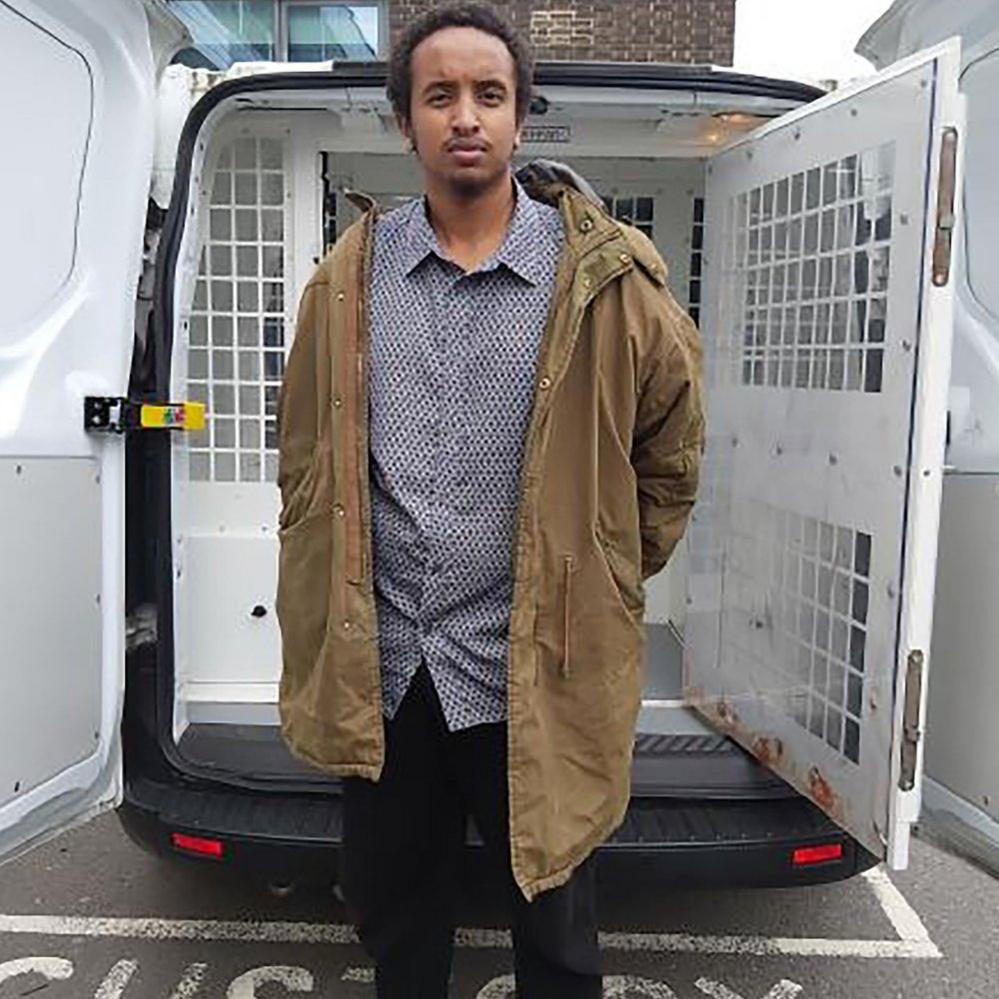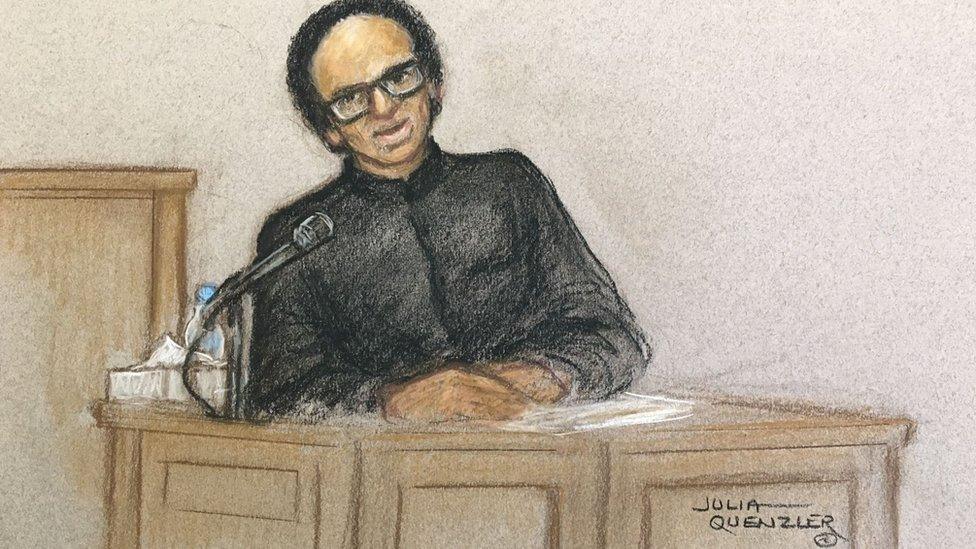Sir David Amess: How MP's killer was a textbook radicalisation
- Published
Watch: Jurors were shown footage from a police interview where the suspect said 'I killed an MP'.
Ali Harbi Ali was born in Southwark, south London, growing up in Croydon. A British national of Somali heritage, he became radicalised by the war in Syria and ultimately decided to kill an MP.
He booked an appointment for 15 October, last year, to meet Tory MP Sir David Amess at a weekly constituency surgery, in Leigh-on-Sea. Once there, he murdered the 69-year-old, stabbing him 21 times. It was an "assassination for terrorist purposes", the jury at his trial was told.
Now convicted of the murder of Sir David, Harbi Ali's motives - made clear during police interviews and his trial - reveal a textbook study of radicalisation.
Upset and anger at Syria war
Civil war was raging in Syria as Harbi Ali entered his late teens and he turned to social media to try to understand what was happening.
"It was probably one of the most documented wars ever in terms of the brutality that was carried out by a tyrant to this day," he said in a police interview.
"And it was seeing the fighting that happened and everything surrounding it that sort of first of all got me interested. And then through that, I learnt about Islamic practices and more about my religion than I knew before."

Harbi Ali stabbed Tory MP Sir David Amess MP 21 times on 15 October last year
Extremist propaganda
The self-styled Islamic State (IS) group became a dominant voice in the coverage of the war because of how it quickly took territory and how it sold a story that it was the legitimate government of God on earth.
IS said there was an obligation on all Muslims to help build this "state" and fight its enemies. As it recruited, willing soldiers then broadcast tales of their new exciting life to people back home.
Harbi Ali bought in to the propaganda - turning a blind eye to the IS group's shocking brutality.
"I guess they were just quite media savvy," he told counter-terrorism detectives. "They would put things out there [on social media] quite quickly that was easily picked up, yeah."
Harbi Ali convinced himself he was under an obligation to act.
And so - for a potentially bored teenager living a humdrum life in suburban London - the war not only appeared like an exciting video game on social media, it came packaged with an appealing message that there was a role for everyone else.
By 2015, Harbi Ali had decided that he would take part in "hijrah".
In Islamic history, the term refers an important episode in the life of the prophet Muhammad when he escaped his enemies to the sanctuary of another city.
Modern-day jihadists distort the the story and tell recruits hijrah is a divinely-ordained migration in order to fight.
"My initial focus was to go abroad," Harbi Ali told police. He wanted to travel abroad to join the fight.
"My second year [of university], around five years ago, I made the decision to drop out and follow the path and make hijrah - which was my preference."

Abu Muhammad al-Adnani: Propagandist told western followers to attack at home
Frustration and a new plan
By late 2018 or early 2019, he was not going anywhere and, by his own admission, was running out of excuses.
Harbi Ali told himself he could instead join the ranks of home-grown attackers - on the basis of an instruction from an IS propagandist who played a major role in the spread of terrorism attacks in western Europe.
"He came out with an audio message essentially saying, 'Strike them wherever you find them,' which is a quote from the Quran," he said.
"It was essentially saying if the doors of hijrah have been closed to you then you have a second option. You're in the place where we hate everyone already - do something there."
The pandemic slowed his plans - but during his police interviews Harbi Ali said he settled quite early on a plan to kill one of 524 MPs who had voted in 2014 in favour of UK air strikes against IS.
Harbi Ali believed this was an attack against Muslims and that he therefore had a just cause to kill an MP as a response.
"Would you describe your decision and your actions as rational?" asked one of the police officers. "Yes," replied Harbi Ali. "If I thought I'd done something wrong I wouldn't have done it, you know."
At times he referred to World War Two, comparing his actions to defeating Nazi Germany. "I think what I [did] was a just cause and for other people they would see fighting Nazis as a just cause."

In the witness box: Harbi Ali appeared relaxed and unconcerned about his actions or fate
Deception
The Metropolitan Police confirmed that between 2014 and 2015 Harbi Ali had some kind of engagement with the counter-radicalisation scheme, Prevent.
He told his trial that he was booked to meet a man from the Home Office in Brixton, south London, who talked to him about the true meaning of Islamic theology.
This sounds like an official "intervention provider" - usually a theologian - but neither the police nor the Home Office will confirm if this is true.
That also means we don't know if Harbi Ali was ever given the all-clear by Prevent bosses, or, as sometimes happens, he walked away refusing to co-operate.
Jurors were shown bodycam footage of plain-clothed police officers tackling Ali Harbi Ali to the ground
He told his trial: "There's a hadith [saying of the prophet Muhammad] that says that war is deception. If to further my war I have to deceive, I will do that."
His deception continued during his trial. When he stepped into the witness box he chose not to swear on the Quran - despite describing himself as a practising "moderate" Muslim.
The reason was simple: it allowed him the space to continue to lie and fantasise until the very end - including his denial that his crime was murder and his intention was terrorism.
Related topics
- Published11 April 2022
